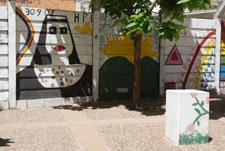Tucked away down a lane in the Old City of Montevideo, Uruguay is a tiny parkette surrounded by murals. Sun-baked and blasted with bone rattling construction sounds from the high-rise next door, the Sexual Diversity plaza is not a comfortable hangout on this warm spring day, but it’s a landmark.
In 2005 it became the first known monument honouring sexual minorities in Latin America — and, it’s located in the capital city of the first Latin American country to legislate same-sex civil unions nationwide.
Overshadowed by neighbouring Buenos Aires, mellow Montevideo has a gay nightlife of its own and some progressive laws protecting its LGBT citizens from discrimination and hatred. A law allowing transsexuals to change their registered gender has passed the Senate and awaits a vote in the Chamber of Deputies.
Eduardo Peñarroja and Dan Mastrogiacomo moved here from Spain and opened a gay men’s B & B called La Puerta Negra.
“We were thinking of living in Brazil or Argentina and then we discovered Montevideo,” says Peñarroja. “It has a style that makes me think of Spain 30 years ago. People are very friendly. Buenos Aires is close if you need more movement, but I’m always happy to come back.”
They are out to their neighbours and haven’t had any problems so far. “We moved here, two men with a small dog — you can immediately see that we are gay,” he laughs.
They don’t hold hands in the street but they will venture a quick kiss in a restaurant. They have regular parties where local men mingle with guests, and anyone can attend their bear events (uruguayosos.com).
My bar crawl starts early (by Montevideo standards) at 2 am, when I hit Chueca, a pre-dance lounge where I find a mellow crowd sitting and talking. Onwards to Il Tempo, where the girls are rumoured to gather on Saturday night. I’m too early and it’s too dark to gauge the male-female ratio easily, but I see a few women with concerned looks on their faces when I miss the step and nearly fall off the dance floor while Elton John and Kiki Dee warble, “Don’t Go Breaking My Heart.”
The next stop is Cain, which is pronounced “Caa-eeen.” The strobe light illuminates a pack of men and one fully dressed hunk dancing on a platform above them.
My last stop is Alexander, a new bar right on the central Plaza de Independencia where I find a young mixed crowd smoking outside. A transwoman on staff brings me downstairs to a room full of enthusiastic dancers. Someone in a skinny clown suit with a flower face is on top of a table, acting out the song.
There are women at the bars, though some of the lesbians I meet at a house party are bored of the scene, telling me they see all the same women. They like to gather at performances by La Melaza, a group of female Candombe drummers.
Most lesbians and bi women are half-in, half-out, according to the house-partiers: usually out to their families, with varying results, and in at their jobs and public life.
Men, they tell me, are extremists, either completely closeted, living double lives, or completely out of the closet.
The youngest generation, the folks I saw hanging out in the main plaza outside Alexander, are more out than ever.
Julia Steinecke’s trip was sponsored by American Airlines and the Ministry of Tourism and Sport of Uruguay.

 Why you can trust Xtra
Why you can trust Xtra